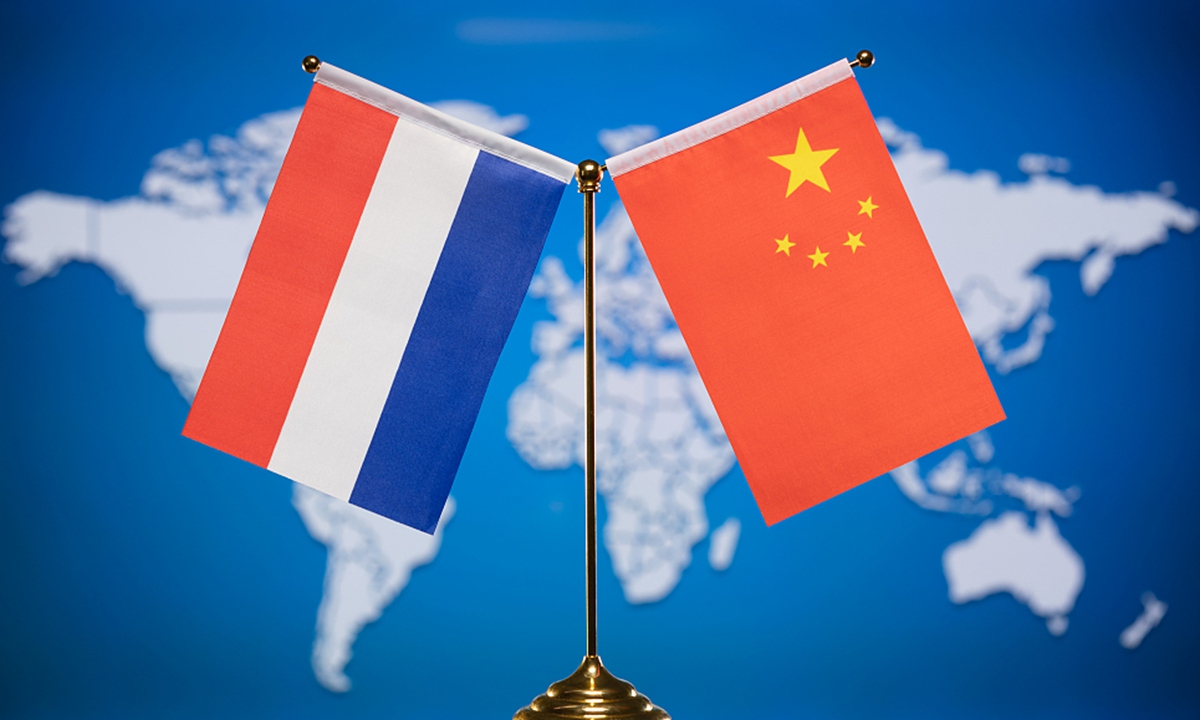
China Netherlands Photo: VCG
Prime Minister of the Netherlands Mark Rutte is on a working visit to China from Tuesday to Wednesday, at a time when the Netherlands' chip export policy has been in the spotlight.
Chinese analysts pointed out that Rutte's visit is perfectly timed, as his country's largest company, the semiconductor equipment maker ASML, is seeking to expand outside the Netherlands after raising concerns about the country's business climate.
They believe that amid weak economic growth, insufficient impetus for technological innovation and spillover effects of the Russia-Ukraine conflict - which most EU state members are faced with - the Netherlands wants to expand cooperation with China in high-end manufacturing, and maintain pragmatic economic and trade cooperation in general.
Foreign Ministry spokesperson Lin Jian confirmed on Monday that Rutte's working visit comes at the invitation of Chinese Premier Li Qiang.
The Dutch media outlet NL Times reported on Friday, citing the caretaker Cabinet announcement, that Rutte will meet with Chinese President Xi Jinping and Premier Li Qiang during the trip.
The two heads of state last met on the sidelines of the G20 Summit in Bali in November, 2022.
The leaders of the two countries will discuss "bilateral and economic relations, the war in Ukraine and the situation in the Middle East," the Netherlands' caretaker Cabinet announced on Friday. The two-day visit will also include talks between Chinese Commerce Minister Wang Wentao and Dutch Foreign Trade Minister Geoffrey van Leeuwen, NL Times revealed.
Although the Dutch government did not specifically mention if ongoing restrictions on the export of high-tech machinery will be a specific discussion point, Reuters, citing sources, reported on Saturday that whether ASML can continue to service billions of euros worth of computer chip equipment it has sold to Chinese customers is expected to be discussed during the visit.
Under pressure from the US, the Dutch government introduced a licensing requirement for ASML's shipments of its most advanced deep ultraviolet lithography machines in 2023.
On January 2, ASML said that the Dutch government had partially revoked an export license for the shipment of some chipmaking equipment to China, according to
a press release previously sent to the Global Times.
In January, the company's CEO, Peter Wennink, said it was poised to expand its operations, media reported.
In response, the Dutch government had launched a cross-ministry effort, dubbed "Operation Beethoven," to encourage ASML to continue to invest in the country, the Dutch newspaper De Telegraaf reported on Wednesday.
ASML has a long history of cooperation with China. However, due to pressure from the US, the Europe, including the Dutch government, eventually yielded to the super power, which damaged the bilateral economic and trade cooperation with China, specifically harming the credibility of ASML, Zhao Junjie, a research fellow at the Institute of European Studies of the Chinese Academy of Social Sciences, told the Global Times on Tuesday.
Chinese experts criticized the US for using long-arm jurisdiction to force its allies to be foot soldiers of its containment and decoupling strategies against China.
In January,
ASML warned that US export controls would affect its sales in China by 10-15 percent in 2024 while announcing better-than-expected results for the fourth quarter and full year of 2023.
ASML wants to expand its operations overseas, which may help ease the mounting pressure both from the American and Dutch governments, Zhao said. In this case, the Dutch government is scrambling to stop the move.
Under such circumstances, Rutte, who is also a popular candidate for NATO Secretary General, is expected to clarify some of the Dutch government's ideas on the issue to the Chinese government, analysts believe.
While the chip tensions strain bilateral ties between China and the Netherlands, the two countries remain pragmatic cooperation partners in many fields.
European politicians, including those in the Netherlands, are currently facing governance challenges such as weak economic growth, insufficient impetus for technological innovation and spillover effects of the Russia-Ukraine conflict, Zhao listed.
In the context, the Netherlands appear to be willing to expand cooperation with China in high-end manufacturing, including green and low-carbon economy, environmental protection technology, biopharmaceuticals and other areas of strength, according to analysts.
Rutte's visit needs to maintain pragmatic economic and trade cooperation with China, reap the benefits from it and appeal to voters, experts said.




